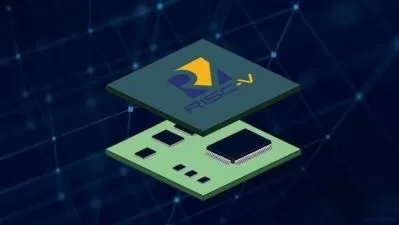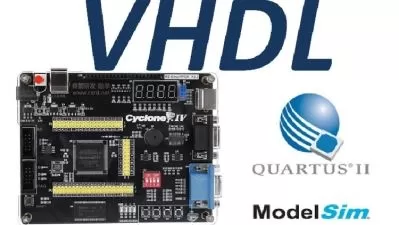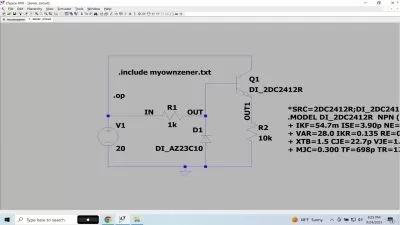Foundations of Li-ion batteries, battery management systems
Akshay Gill
5:11:24
Description
A comprehensive course on getting you started with batteries and battery management systems with a practical approach
What You'll Learn?
- Foundations of lithium-ion batteries
- Foundations of battery management
- Foundations of electric vehicle batteries
- Practical understanding of batteries and battery management systems
Who is this for?
What You Need to Know?
More details
DescriptionThere are no pre-requisites to this course and no previous knowledge of Battery Technology or Battery Management Systems is needed.
Are you looking for a successful career in the Electric Vehicle / Battery Technology industry?
Are you a startup creating products and services for the EV / BMS industry?
Are you an established business in the EV industry looking to up-skill your staff?
Are you a university or college looking to train students for the EV industry?
Are you a student aspiring for a fulfilling career in the EV industry?
HERE'S WHAT IS INCLUDED IN THIS COURSE
MODULE 1 - WHAT IS A BMS, IS IT NECESSARY?
In this module, you will learn what a Battery Management System (BMS) is and why it is necessary in certain types of products.
Intuitively understand what is inside a BMS
What type of products need a BMS
Can you ship a product without a BMS
Do all battery types need a BMS
MODULE 2 - DEEP DIVE INTO BMS HARDWARE AND IDENTIFYING COMPONENTS
What hardware sections are in a BMS
Dive into a BMS schematic to understand its components
How to identify the parts of a vehicle BMS
How to identify the parts of a stationary storage BMS
MODULE 3 - HOW DOES THE BMS SOFTWARE WORK TOGETHER WITH THE HARDWARE
What is the difference between firmware, hardware and software
What role does software play in a BMS
How does the BMS firmware work with the hardware to measure voltage
How does the BMS firmware work with the hardware to measure current
How does the BMS firmware work with the hardware to measure temperature
MODULE 4 - BMS TECHNOLOGY COMPLEXITY
What decides the rating of components in a BMS
Do all products have similar BMS
Failure mitigation mechanisms of a BMS
MODULE 5 - DEBUGGING OF BMS SYSTEMS
Identifying failures in a BMS
Debugging hardware failures
Debugging firmware failures
Develop experience in failure analysis
Who this course is for:
- Students looking to get a job in the electric vehicle or battery industry
- Professionals looking to get a job in the electric vehicle or battery industry
There are no pre-requisites to this course and no previous knowledge of Battery Technology or Battery Management Systems is needed.
Are you looking for a successful career in the Electric Vehicle / Battery Technology industry?
Are you a startup creating products and services for the EV / BMS industry?
Are you an established business in the EV industry looking to up-skill your staff?
Are you a university or college looking to train students for the EV industry?
Are you a student aspiring for a fulfilling career in the EV industry?
HERE'S WHAT IS INCLUDED IN THIS COURSE
MODULE 1 - WHAT IS A BMS, IS IT NECESSARY?
In this module, you will learn what a Battery Management System (BMS) is and why it is necessary in certain types of products.
Intuitively understand what is inside a BMS
What type of products need a BMS
Can you ship a product without a BMS
Do all battery types need a BMS
MODULE 2 - DEEP DIVE INTO BMS HARDWARE AND IDENTIFYING COMPONENTS
What hardware sections are in a BMS
Dive into a BMS schematic to understand its components
How to identify the parts of a vehicle BMS
How to identify the parts of a stationary storage BMS
MODULE 3 - HOW DOES THE BMS SOFTWARE WORK TOGETHER WITH THE HARDWAREWhat is the difference between firmware, hardware and software
What role does software play in a BMS
How does the BMS firmware work with the hardware to measure voltage
How does the BMS firmware work with the hardware to measure current
How does the BMS firmware work with the hardware to measure temperature
MODULE 4 - BMS TECHNOLOGY COMPLEXITY
What decides the rating of components in a BMS
Do all products have similar BMS
Failure mitigation mechanisms of a BMS
MODULE 5 - DEBUGGING OF BMS SYSTEMS
Identifying failures in a BMS
Debugging hardware failures
Debugging firmware failures
Develop experience in failure analysis
Who this course is for:
- Students looking to get a job in the electric vehicle or battery industry
- Professionals looking to get a job in the electric vehicle or battery industry
User Reviews
Rating
Akshay Gill
Instructor's Courses
Udemy
View courses Udemy- language english
- Training sessions 31
- duration 5:11:24
- Release Date 2025/01/24










